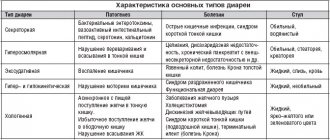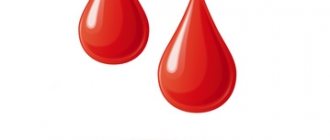Causes of severe diarrhea with water in an adult
When water diarrhea occurs in an adult: the reasons are the first thing to find out. The main mechanism for the development of secretory diarrhea is a disruption of the absorption of fluid and electrolytes in the small intestine. Moreover, by liquid we should understand not only the water that comes with food, but also digestive enzymes - and about 7 liters of them are produced during the day.
The small intestine absorbs most of the moisture - up to 80%. The remainder reaches the large intestine, where it participates in the formation of feces. If the liquid bypasses the small intestine, or too much of it enters, diarrhea forms instead of stool of normal consistency.
Secretory diarrhea, or watery diarrhea in an adult without pain, can be caused by:
- Infectious diseases - cholera, yersiniosis, food toxic infections.
- Acute poisoning - including intoxication with arsenic, organophosphorus substances, insecticides.
- Specific hormone-producing tumors - mastocytoma, gastrinoma, VIPoma.
- Hereditary diseases - sodium diarrhea, chloridorrhea.
- Reaction to certain medications - for example, castor oil or strong laxatives (phenolphthalein, hay).
- Pathologies leading to impaired absorption of fatty and bile acids - for example, Crohn's disease.
Common signs of watery diarrhea include loose stool consistency and increased frequency of bowel movements—up to 10–15 times a day. In this case, there is no pain, inclusions of mucus, pus and blood in the stool.
If the stool has a yellow or green tint, this indicates a malabsorption of bile acids. This symptom is characteristic of chronic diseases of the digestive tract, and is also non-infectious in nature. In other cases, it is difficult to determine the cause of the malaise by the color of liquid stool - tests are needed.
Treatment of clear loose stools
Before talking about the methods of therapy that are used to rid the patient of clear diarrhea, it should be warned that any food poisoning, infection and other phenomena accompanied by dyspeptic symptoms in the gastrointestinal tract must be diagnosed by a specialist.
The set of necessary treatment measures should also be prescribed only to them. This is necessary for the reason that frequent, clear diarrhea may indicate various organic or infectious diseases. Determining which of them is present in a particular person is the prerogative of only a qualified specialist. It is not recommended to immediately try to stop loose stools, as this will not allow the microorganisms that have colonized it to be removed from the intestines, which will further provoke the development of the pathology that causes clear diarrhea. First of all, it is necessary to strengthen the drinking regime and consume rehydration solutions in sufficient quantities, which will reduce the risk of developing dehydration. In the event that clear diarrhea accompanied by severe vomiting has caused significant dehydration of the body, the administration of saline solutions is carried out in a hospital using droppers.
source
Causes of watery diarrhea in a child
Water diarrhea in a child is caused by the following reasons:
- Intestinal infections of bacterial or viral etiology. Accompanied by nausea, vomiting, severe weakness, fever, and other symptoms of general intoxication. They quickly lead to dehydration and therefore require immediate treatment.
- Dysbacteriosis is an imbalance of intestinal microflora. It develops as a result of a long-term illness, poor nutrition, and taking antibiotics. with dysbacteriosis, watery diarrhea alternates with constipation. The stool has a greenish tint, has a specific sour odor and the presence of foam.
- Poor nutrition. Both the consumption of certain foods (for example, raw vegetables and fruits in large quantities) and banal overeating can lead to severe bowel upset in a child. The cause of the malaise may be individual intolerance to honey, cow's milk, cereals or other allergens.
- Severe stress - experienced fright, fear, excessive excitement. They cause a short-term stool disorder that goes away on its own after a few days.
- Acute respiratory diseases. When cold symptoms and watery diarrhea are combined, it is important to differentiate ARVI itself from enteroviral infections. To eliminate the symptom, the underlying disease must be treated.
The greatest danger is severe diarrhea with water for infants, pregnant women, and people with weakened immune systems. Due to the small body weight of an infant, dehydration can occur extremely quickly, and the low efficiency of the body's defenses will lead to serious complications.
In this case, calling emergency services is mandatory.
Complications of prolonged diarrhea
Prolonged diarrhea without treatment can lead to complications:
- dehydration;
- electrolyte disturbances;
- malnutrition;
- vitamin deficiency.
With timely consultation with a doctor, intestinal infections can be completely cured. With non-infectious diarrhea, in 80% of cases it is possible to achieve an improvement in well-being.
In continuation of the topic, be sure to read:
- Irritable bowel syndrome: symptoms and treatments
- Causes of bloating and increased gas formation, treatment methods
- What medications should I use for increased gas formation?
- Intestinal disorder and methods of its treatment: diet and medications
- Rectal fissure: causes, symptoms and treatment of pathology
- Details about the coprogram: preparation, conduct and interpretation of the analysis
- What is diarrhea syndrome and how does it manifest?
- Intestinal inflammation: signs of pathology, use of diet and drugs for treatment
- Pus in stool: causes, diagnosis and treatment (first aid, medications) + photo
- Intestinal colic in a child: symptoms and treatment (first aid, medications, nutrition)
Be sure to read:
Irritable bowel syndrome: symptoms and treatment methods
Treatment methods: review of effective remedies
When an adult has severe water diarrhea, what should you do? Until the cause of the illness is identified, you can take enterosorbents - Smecta, Polysorb, Enterosgel or their analogues. They will help bind toxic substances that cause inflammation of the small intestine, as well as excess enzymes, and remove them from the body. In addition, some sorbents envelop the mucous membrane of the digestive tract, protecting it from irritation. In this case, it is better to give preference not to tablets, but to gel-like products.
A mandatory measure for diarrhea with water is to replenish moisture reserves in the body. You need to drink a lot of liquid. Regardless of the cause of secretory diarrhea, water-salt pharmaceutical solutions (Regidron, Humana Electrolyte) and clean water are useful. If the presence of enteritis (an inflammatory process in the small intestine) is established, the patient is recommended to drink warm chamomile tea, rosehip decoction, and compotes.
Further therapy requires an accurate diagnosis and medical participation. In general, if an adult has water diarrhea, treatment includes the following methods:
- When identifying the bacterial nature of the underlying disease, use antibiotics. The following drugs are often used: Intetrix, Furazolidone, Enterol.
- If an allergy to a certain food is detected, exclude it from the diet and use antihistamines. The most effective are the third generation drugs - Levocyterizine, Desloratadine, Fexofenadine. They do not cause drowsiness, do not affect coordination of movements and the ability to drive a vehicle.
- If diarrhea is caused by poisoning, gastric lavage is mandatory. In a hospital setting, it is performed using a probe; at home, vomiting is artificially stimulated. Further therapy helps normalize digestion and eliminate the effects of intoxication.
- To eliminate painful abdominal cramps, antispasmodics are used - No-shpa, Drotaverine, Papaverine. Before the doctor arrives, they can be taken once, after the diagnosis is made - as prescribed.
- To restore healthy intestinal microflora, the patient is prescribed pre- and probiotics. The most famous are Bifidumbacterin, Baktisubtil, Hilak-forte.
- Antidiarrheal drugs are prescribed if the symptom is caused by a chronic gastrointestinal disease. Imodium, Loperamide, Enterobene are used. They slow down peristalsis and increase the tone of the anal sphincter, which helps stop diarrhea.
Therapy for diarrhea with water should be aimed at eliminating the main cause of the ailment. Therefore, it cannot be said that any particular remedy is most effective for all cases of secretory diarrhea. If diarrhea with water is caused by a bacterial infection, treatment should suppress the activity of pathogenic microorganisms, so the patient is prescribed antibiotics. If diarrhea with water is caused by rotavirus or poisoning, antibiotic therapy only worsens the situation.
Types of pain
Based on the type of pain, the doctor determines the possible cause of the pathology. Each disease is characterized by certain types of pain.
Acute
Severe stomach pain due to appendicitis. The pain is very intense, cutting, and intensifies with movement. Irradiation to the right side is typical. Associated symptoms are fever, abdominal pain and diarrhea.
Aching
During attacks of exacerbation of a peptic ulcer or gastritis, the patient feels a pulling, aching sensation in the abdomen, spreading to the entire abdominal region. In some cases, such symptoms are observed during overeating.
Spasms
Abdominal spasms and diarrhea can be observed due to the movement of stones in cholelithiasis and cholecystitis. This pain is relieved with antispasmodic drugs. Cramps and diarrhea occur with irritable bowel syndrome.
Shingles
Severe cramping pain in the abdomen occurs with acute pancreatitis and pancreatic necrosis. Pain syndrome develops due to necrosis of organ tissue. During an attack, the patient feels a girdling pain in the upper abdomen, spreading to the back.
An attack of pancreatic necrosis requires urgent medical intervention.
Alternative home treatments
If water diarrhea occurs in an adult, treatment at home can combine methods of traditional and traditional medicine. The attending physician must be notified that herbal medicine will be used: despite its natural composition, it also has a number of contraindications and side effects.
Most often, when treating diarrhea with water, decoctions of the following medicinal herbs are used:
- yarrow;
- plantain;
- sage;
- eucalyptus;
- St. John's wort;
- burnets;
- nettle;
- sequences;
- lingonberries;
- lemon balm.
They are used both independently and as part of collections. The general rule is to drink the healing decoction warm and fresh. Each time you need to prepare a small portion of the medicine.
Treatment
When white diarrhea is caused by bacterial diseases, antibiotics become the basis of therapy. When:
- For pancreatitis, the doctor prescribes painkillers and enzymes.
- Symptoms of cholecystitis are eliminated through antispasmodics and choleretic medications.
- Treatment of white diarrhea resulting from dysbacteriosis occurs with the help of enzymes (Bifiform, Hilak forte, Baktistatin, Linex), which normalize the functioning of the intestines.
Medicines must be taken strictly as prescribed by a specialist. The main rule for treating bowel movements is to replenish the water balance. To do this you need to drink more water. You can use special solutions (Ringer, Regidron) sold in pharmacies. You should not drink soda, compotes, or fruit drinks at this moment; they will adversely affect the consistency of stool.
For seriously ill patients, water-electrolyte solutions are introduced into the body using a dropper. In addition to replenishing fluid, you will need a certain diet (rice porridge with water, decoctions, jelly, crackers). Home remedies (tincture of wormwood, blueberries, bird cherry, decoction of oak bark, etc.) will help to positively eliminate white diarrhea.
When light diarrhea can be quickly eliminated, this indicates that the main cause has been removed. To avoid recurrence of symptoms, you need to perform a comprehensive examination to determine the diagnosis. Then complete the therapeutic course prescribed by the doctor.
The information on our website is provided by qualified doctors and is for informational purposes only. Don't self-medicate! Be sure to consult a specialist!
Author: Rumyantsev V. G. Experience 34 years.
Gastroenterologist, professor, doctor of medical sciences. Prescribes diagnostics and carries out treatment. Expert of the group for the study of inflammatory diseases. Author of more than 300 scientific papers.
source
Therapeutic diet: how to properly create a diet
The peculiarity of secretory diarrhea is that during fasting it does not go away - only the volume of bowel movements decreases slightly. Therefore, the patient must eat properly and nutritiously, observing the following principles:
- All foods that can cause an allergic reaction are excluded from the diet.
- Products that cause chemical or mechanical irritation of the digestive tract are prohibited. These include coarse grains, sour fruits, berries, spices, and hot sauces.
- In order not to provoke the activation of pathogenic microflora, the consumption of desserts, confectionery, and whole milk is limited.
- To avoid dyspeptic symptoms (bloating, heartburn, flatulence), do not drink sweet carbonated drinks, fatty meats, fish, and legumes.
Boiled and baked vegetables, as well as steamed dishes, are healthy. Meat can be present in the diet, but only lean meat - chicken, turkey, rabbit. Lactic acid products - kefir, acidophilus, yogurt, cottage cheese will accelerate the normalization of intestinal microflora and eliminate dysbiosis.
For infants, breast milk is enough to restore digestion. Meals should be frequent, but in small portions. Lactose-free formulas are recommended for bottle-fed babies. For children one year old and older, it is useful to give kefir, acidophilus milk, and cook porridge based on vegetable decoctions.
Diseases
White liquid stool, associated with a foul odor and expressed for a long time, may indicate the development of a disease of the internal organs.
Hepatitis
The disease is characterized by yellowing of the skin, whites of the eyes, dull painful sensations in the abdominal cavity, and a violation of the consistency of stool. Hepatitis, provoked by a viral irritant, often goes away with febrile symptoms and an increase in temperature.
Other forms of the disease are not so pronounced, they are mostly chronic, but at the time of exacerbation the symptoms are almost the same.
Cholecystitis
This pathology is characterized not only by frequent bowel movements, but also by severe pain in the right hypochondrium. When the disease is in an acute stage, hospitalization will be required.
Symptoms of cholecystitis: intense pain, high fever. The pulse rate is accelerated. In the chronic form, there are no pain sensations as such, however, the shade of the whites of the eyes and skin changes. A person experiences bloating, stool becomes white, and urine becomes dark and foamy.
Pancreatitis
The disease is accompanied by the following symptoms:
- white diarrhea;
- nausea, vomiting with a bitter taste;
- temperature increase to 37.5 °C;
- cloudy urine;
- feeling of pain in the upper abdomen.
Sometimes yellowness of the skin may be observed.
Gallstone pathology
At the first stage of development, gallstone disease passes without noticeable symptoms. After several days, the signs become most visible: loose white stools appear, pain in the area of the shoulder blade, chest, and shoulder.
Oncology
Light-colored stools and their disorder can be a symptom of a cancerous tumor of the gallbladder or gland, stomach, or liver. Other signs depend on the stage of the disease and the location of the tumor.
Therefore, changes in stool and color of stool can indicate a dangerous pathology and lead to serious consequences.
Other factors
Other reasons can lead to white stool:
- Dysbacteriosis - usually occurs in infants. Here, in addition to liquid diarrhea, particles of undigested food and mucus are noted. The child eats poorly, loses weight, and develops insomnia.
- Rotavirus infection - the disease initially manifests itself with the appearance of diarrhea, first yellow, then gray, sometimes white. Vomiting and high body temperature occur. The patient develops rhinitis, sore throat, and migraine.
- Whipple's disease is an intestinal disorder of an infectious nature. Develops rarely, mainly before 3 years of age. Symptoms: muscle pain, thirst, rapid heartbeat, inflamed gums.
- Food poisoning – in adults and children, poisoning is caused by stale, expired food. Here you will need medical attention, since an infectious disease (salmonellosis, botulism) may occur.
- Stress – “bear sickness” – often occurs among students during a session.
Treatment
Diarrhea is not an independent disease, but one of the symptoms of the above pathologies, which must be eliminated immediately. Treatment options will depend on the cause, so it is important to determine the source of the problem. Regular light-colored diarrhea with a normal diet may indicate the presence of liver or digestive diseases. In the first case, diet and bed rest, hormonal therapy, and medications to improve metabolism are prescribed. If the cause of diarrhea lies in pancreatitis, then the use of enzymatic and antispasmodic agents (Creon, Pancreatin) is indicated. For cholecystitis, medications are used to stimulate the outflow of bile (Allohol, Chofitol).
There are general rules for the treatment of diarrhea, which involve the use of the following medications:
- Citroglucosolan, Regidron, Gastrolit will help replenish fluid loss and restore water-salt balance.
- Activated carbon, Polyphepan, Smecta, Enterosgel, Filtrum-sti, bismuth salts are sorbents with the help of which toxins, viruses and bacteria are removed from the body.
- Hormonal drugs (Metypred, Prednisolone) are indicated for Crohn's disease.
- Pancreatin, Mezim, Creon are enzymatic medications.
- Loperamide, Imodium, Lopedium slow down intestinal motility and stop diarrhea. These drugs are contraindicated for diarrhea of bacterial origin, since as a result of their intake, harmful microorganisms and toxins remain in the digestive tract.
- Bifidumbacterin, Hilak forte, Maxilak, Acipol, Linex restore intestinal microflora.
If you have diarrhea, you need to switch to light foods, eat boiled and baked dishes, cereals, give up fresh vegetables, foods that stimulate peristalsis and have a laxative effect, for example, beets, prunes, etc. It is recommended to drink strongly brewed fresh black tea, rice water, jelly, infusion of bird cherry fruits, oak bark, chamomile flowers..
source










